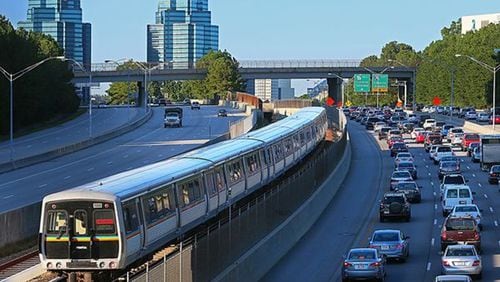MARTA enters the new year searching for a new chief executive and unsure of its role in a regional transit governance system being developed in the General Assembly.
But, MARTA officials say, this much is certain: The transit system will continue to improve and power economic development in the Atlanta region. And, they say, MARTA makes Georgia a strong contender for Amazon's new headquarters.
“We are far from perfect, and certainly work remains to be done,” MARTA Board Chairman Robbie Ashe said at the annual “state of MARTA” breakfast in Atlanta on Friday. “But we are committed to making MARTA better than ever before.”
Several hundred business and political leaders attended Friday’s event, co-hosted by the Council for Quality Growth. They heard an upbeat message about the future of MARTA and the region it serves.
Interim CEO Elizabeth O'Neill recited a slew of recent accomplishments. MARTA improved its bottom line for the fifth consecutive year. Customer service surveys show its standing with passengers continues to improve, while crime on MARTA has declined. And the system has unveiled or expanded a variety of services to make riding MARTA more pleasant, from arts programs to fresh food markets at stations.
O'Neill said MARTA will continue improvements in 2018. All the rail coaches are being replaced and wi-fi is being developed for the trains. Atlanta will see more buses and expanded service, thanks to a $2.5 billion referendum approved by city voters in 2016.
But MARTA also finds itself at a crossroads. CEO Keith Parker, who many credit for shoring up the agency's finances, left last fall to become president of Goodwill Industries of North Georgia. The departure comes at a critical time for the agency and for regional transit discussions.
Atlanta and Clayton County officials are plotting the details of expansions. And state lawmakers are seeking to consolidate the planning and funding of mass transit in metro Atlanta into a single governing board, instead of leaving it to an alphabet soup of local agencies.
Some lawmakers want the proposed board to oversee transit in the five largest metro counties – Fulton, Gwinnett, Cobb, DeKalb and Clayton. Others say it makes sense to expand the board to the 13 counties served by the state’s Xpress bus service.
Ashe acknowledged the uncertainty as he introduced transit leaders in the audience at Friday’s breakfast, including members of the state board that oversees the Xpress bus system.
“Depending on how the governance discussions go (in the Legislature), I may have to call you ‘boss,’” he joked, addressing the board.
Despite the uncertainty, Ashe said MARTA will continue to thrive. He expects to have a new top-tier CEO in place by the end of March. And he pledged to work with lawmakers to improve cooperation among the region's transit agencies.
As for Amazon, he said Atlanta stands out for meeting one of the company’s prime criteria for a new corporate headquarters: An extensive transit system with access to a major airport.
“I think it sets us apart from all of our competitors,” Ashe said.
MYAJC.COM: REAL JOURNALISM. REAL LOCAL IMPACT.
The AJC's David Wickert keeps you updated on the latest in what's happening with transportation in metro Atlanta and Georgia. You'll find more on myAJC.com, including these stories:
Never miss a minute of what's happening in Atlanta transportation news. Subscribe to myAJC.com.








